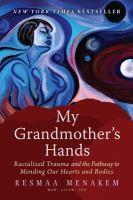
This is unlike any other book I've read on racism, and it's a good, refreshing thing.
Menakem is a therapist, and his perspective starts with the body. He sees the trauma induced by racism as a physical thing and posits that we need to address as such. Specifically, in the vagus nerve, "which oversees a vast array of crucial bodily functions, including control of mood, immune response, digestion, and heart rate. It establishes one of the connections between the brain and the gastrointestinal tract and sends information about the state of the inner organs to the brain via afferent fibers."* The vagus nerve activates what Menakem calls the lizard brain, the automatic, instinctive part of our brain that precedes and can override the cognitive brain. The distinction, I believe, that Daniel Kahneman prominently makes between fast thinking and slow thinking. It's where things like implicit bias take place. Unthinking reactions. Gut reactions. So to heal the trauma of racism we don't need to address our slow, cognitive brain so much as we need to get at the lizard brain and the parts of our body in dialogue with it.
When I saw the words "racialized trauma" in the subtitle I assumed this would be mostly addressed to a Black audience. It's not. Menakem explicitly speaks to three audiences in turn: Black, white, and police. Each holds onto a different type of trauma associated with racism, and each has different needs to heal it. He gives a good overview of the history of racism through to the present moment, made all the more interesting for his body-centric perspective; he not only covers familiar ground, he adds to it. He has some wonderfully powerful anecdotes from his experiences and finds ways to make everything personal. And the core of his book is the "body practice," simple steps each audience can take to calm and heal their bodies.
Menakem is a therapist first and writer second, and I see many ways a good editor could have made this book stronger, but he always communicates clearly and effectively, and the content is invaluable. This is a fascinating book that I recommend to anyone who spends any time reading about and working on racism.
-----
*www.ncbi.nlm.nih.gov/pmc/articles/PMC5859128/
